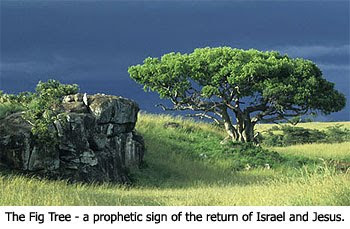What did Jesus mean when He said that the generation that sees the blossoming of the fig tree will witness His return? What generation was He talking about? And how long is a generation?
I believe that Jesus meant exactly what He said — that the generation that sees the re-establishment of the nation of Israel is the one that will witness the Lord’s return. This is the most important reason I believe that we are the terminal generation.
People frequently ask me how long is a generation? The answer is that it depends upon context. In Genesis 15:13-16 a generation is defined as 100 years. In Psalm 90:10 it is 70 years. A generation based on the genealogy presented in the first chapter of Matthew calculates to be about 50 years. Job 42:16 says Job lived 140 years and saw four generations during his lifetime, which would make a generation 35 years. The Bible frequently refers to a generation as being 40 years (Numbers 32:13; Psalm 95:10; and Hebrews 3:8-10). Some passages seem to indicate that a generation was viewed as starting at age 20 (Exodus 30:14; Numbers 1:3; and Numbers 14:29). If that were so, and you add 40 years, then a generation would have been from 20 to 60 years of age.
But, the word is also used generically to refer to people living at a particular time, and when it is used this way it does not refer to any specific number of years. An example can be found in Jeremiah 7:29 where the prophet declares that God has rejected “the generation of His wrath.” That is simply a reference to the people living at that time. It would be like making a reference to the “Nixon generation,” meaning all the people living during the time that Richard Nixon served as President. In like manner, people refer to the “Hippy Generation,” which is a reference to young people living during the 1960’s.
I believe the term is used generically in Matthew 24:34. All it is saying is that the people living at the time the nation of Israel is re-established will be the ones who will witness the return of the Lord. It could be a person who was a small child at that time and who will be 80 years old when the Lord returns. No time period is meant or implied.
Can the Rapture be found in the Olivet Discourse? Or, does Jesus speak exclusively about His Second Coming? Find out as we continue with the last segment in this “Olivet Discourse” series!









1) a generation can also mean a type of people (a generation that seeks God of jacob or preverse generation) since jesus is talking about signs that would hardly fit the context but people use it. 2)i`m REALLY looking forward to the next post about the raptyre
I agree. A study into everytime Jesus uses the word, "Generation" results in that conclusion to me as well. "Generation of vipers" didn't just mean THAT group of unbelieving Phrasees/religious leaders. That's just one other time He said, "Generation".
Here is something I wish to address. Modern dispensationlists teach that the Rapture is a secret event requiring no signs, then why do they continue to look for signs?
If in fact that Rapture is a signless event when all other prophetic events clearly are not, then why look for signs of the Rapture in the "Olivet Discourse"? Surely there is nothing to identify with, for the Doctrine of Imminence would then have to be thrown out as erroneous. Food for thought my friends. God is not the author of confusion.
Any sign being touted by scholars today as identifying the nearness of the Rapture would nullify the Doctrine of Imminence. Under the terms of a PreTrib and PreMillenial dispensation, there can be no signs signalling the Rapture of the Church. What can then be said regarding this modern Eschatological interpretation?
rodney you are correct in saying the rapture is a signless event BUT the 2nd coming is not and if we see signs of the 2nd coming the the rapture, a signless event, is all the closer so thats why we look for signs.
hartdawg, if we agree that the Rapture can happen at any moment as most modern dispensationalists have taught, then clearly we can not attribute this to any signs concerning the second coming or the whole theory wrapped around the Doctrine of Imminence must be thrown out.
Most of us can produce a long laundry list of scholars setting dates for the Rapture coinciding with Jewish Feast Days or events. At the same time these same scholars whose books mimic these ideas will publicly state the Rapture is a signless event. I believe frankly the confusion stems from their attempt to detach themselves from what the Apostles truly taught, which is the Rapture is not a signless event.
That is my take on the matter, the association with the exchange of the baton from the Church to Israel is enough to convince me, yet even more than this is the letters of the Apostle Paul to the Church in Thessalonica. If the Church is instructed to watch and be sober, what are we watching for if not for signs associated with our gathering in the clouds of heaven. Surely we are not watching for the Time of Wrath or the Second Coming to rescue Israel and establish the Kingdom.
The Bride waits and watches in anticipation for the coming of the Bridegroom. Israel waits and watches in anticipation of the coming King to establish the Kingdom. The Olivet Discourse was provided by the Lord to a Jewish audience in expectation that the Messiah would establish the Kingdom at that time for the Church was not yet established.
Rodney
"The Olivet Discourse was provided by the Lord to a Jewish audience…"
This has been my own stance for so long it feels strange to contradict it. As a Postie bro. pointed out to me a while ago, not only a Jewish audience, but also the men who were to be the foundations of the Church.
As for the theory that the three witnesses required to substantiate your theory are Zechariah, Obadiah, and Joel; where are the two or three witnesses to support that theory? 😉
The fig tree is the jew, not Israel. Israel is a people not a land. The jew is not Israel. The woman at the well was an Israelite, she was not a Jew. John 8:47 Jesus said to the jews, you are not my people.
How did the 10 virgins know to be waiting for the bridegroom on that particular night. Did they wait in such a state of readiness every night for a week, a month, a year? If so, I can understand why five were caught short on oil, due to having to get all gussied up every night to hang out weighting for the call. The five that are low on oil is presented as a great tragedy that could have been easily avoided by simple state of readiness, by understanding the time. Ever for the lazy virgin, they certainly understood enough to be out there weighting that night. They understood the model of the Jewish wedding in its several stages of progression.